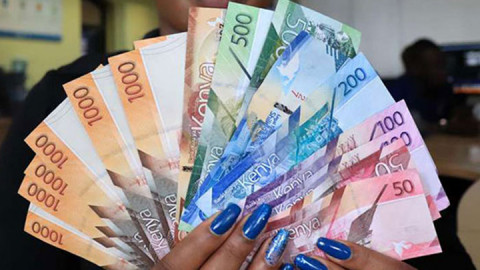For many, debt is part of fulfilling financial goals.
While generally, taking a loan of whatever kind comes with associated costs, oftentimes people do choose to incur the repayments costs of taking debt that helps them make big purchases such as a home, or financing education when saving up for the same would take longer to derive the desired utility.
Many other times, some reasons for going into debt are not as well thought out and could lead to financial distress down the road.
If you will have to take on a debt at some time in your life, how will you be able to tell when it is worth it? How do you get to know if the cost of the credit is worth the benefits?
There is such a thing as a ‘good debt’. For example, a debt that eventually improves your life and will ultimately benefit you and your situation financially. For instance, investing in quality education.
Read More

However, when you are dealing with debt, it’s important to remember that even ‘good debt’ can very well become a ‘bad debt’ if you do not handle it with care.
So how do you cope with the debt (of any size) you may have?
1. Be Aware of Your Debts
Stay on top of all that you owe by creating a list of all your debts and tracking them regularly. This includes the creditor, the total amount of debt, the monthly payment, the interest rate, and the due dates.
By doing this, you have the complete picture of your debt burden and will easily be able to identify any challenges that arise from this debt portfolio - especially things that may make you fall into default.
It is important to remember to refer to your list periodically especially when you pay your bills. Do update this list after the period you will have set as the amount of debt changes.
2. Be Punctual with Your bills
Late payment of bills could make it a bit harder to pay off your debt because you will have to pay a penalty for every payment you miss. Missing more than two payments in a row only increases your interest rates and finance charges.
You could use the calendar system on your smartphone, computer or the good old pen and paper. Enter your bills there and set a reminder for several days before the payment is due. If, in any case, you miss a payment, you don’t have to wait until the next due date to make your payment. If you do, you risk being listed at a Credit Reference Bureau by then.
Send your payments as soon as you remember it has been missed
3. Create a Monthly Bill Payment Calendar
Create a bill payment calendar to help you decide which payments to make with which paycheck. On this calendar, you can write each amount of payment next to the due date.
After that, fill in the dates of every paycheck. If you get your income on the same date every month, say the 31st, you can use the same calendar every month. But, if your paydays fall on different dates of the month, you will have to create a new bill calendar every month.
4. Make at Least the Minimum Payment
In some cases, you cannot afford to pay anything more. In this case, you should ensure that you make the minimum payment. Making the minimum payment does not help you make significant progress with your debt, but it will keep your debt account in good standing and consequently avoids late fees.
Missing payments makes it harder to catch up and your account will probably eventually go into default.
Note that making minimum repayments only can get you in debt for a longer period of time which will translate to higher cumulative interest paid if the interest rate structure is reducing balance.
This is especially true for credit card debt.
5. Choose Which Debts to Get Rid of First
After listing all your debts, assess the bills that have very high interest rates and rank them in the order from highest rate to lowest rates.
For example, beginning with loans given to you by shylocks. Of all your debts, loans from shylocks could be given higher priority on repayment because they may cost you the most money.
You could also decide to pay off the debt with the lowest balance on the list, first. This may cost a little bit more in the long run, but getting rid of small debts first can help build your confidence.
6. Create an Emergency Fund Account
Savings go a long way to cushion a person in adverse situations. Without savings, you would have to plunge into debt to be able to cater to an emergency expense. Having even a small emergency fund may cover the little expenses that arise every once in a while.
You could start by first creating a small emergency fund - depending on your income level, Ksh20,000 could be a good place to start.
Once you have achieved that, you could target a bigger fund like Ksh 50,000. With time, you will want to build a reserve of six months of living expenses - this is ideally how big your emergency fund should be if you are to effectively absorb shocks from unexpected events.
If you are considering opening an emergency fund in a bank savings account, it is always a good idea to compare the interest rates and withdrawal terms offered by different banks to get a good picture of where your money will grow best and choose the account that best suits your needs.
7. Make Extra Money
If your income is from a commission-based job, it means you need to make more sales to be able to cover credit expenses.
Taking on another job in times when you are not at work or over the weekends might also bring in the cash required to close in on the borrowing gap.
Also, selling off the things you no longer find useful or need will go ahead to help you get extra cash.
While the Coronavirus pandemic has led to massive job losses, it has also created several opportunities especially in remote and online work.
What’s more? In the pursuit of making an extra income, have you ever considered monetising your hobbies. You will be happy to know that many Kenyans are actually earning a living, even creating fully-fledged businesses from what started as hobbies.
8. Recognise the Signs That You Need Help
If it becomes difficult for you to settle your debt and pay other bills every month, then you may require outside help. Some options for getting debt relief include:
• Debt consolidation, which refers to taking out a new loan to pay off other debts and liabilities
• You can file for bankruptcy - This is a legal process that may either reduce, restructure or eliminate your debt.
Each of these options have their pros and cons so you have to weigh which options you will go for carefully.
Wrapping Up
Even with a little debt, it has to be well managed as a basic money management tenet. It is important for you to keep up your payments so that your debt does not spiral out of control.
Large amounts of debt require even better structure in ensuring they do not lead to serious financial distress - one of the worst-case scenarios is loss of property placed as collateral or severing relationships with your guarantors.
At the very least, defaulting on loan repayments will lead to higher penalties and could also influence the cost of credit for the subsequent loans you may want to take if lenders judge your borrowing history to indicate a high-risk borrower.
That said, and as we have discussed, debt of any size can be well managed if all caution is taken to prevent default as well as recognising signs of distress and reaching out to your lender for options such as debt restructuring.
This article originally appeared on Money254. Money254 helps consumers and business owners to search, compare and apply for financial products in Kenya.



 shares a light moment with the company's Group CEO Dr Patrick Tumbo (right) at a past event-1758121528.jpeg)
-1758116028.jpeg)



